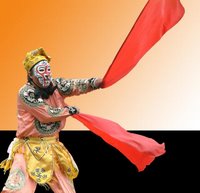Nguyen Trai

Nguyen Trai (1380-1442) is one of the great poets of Vietnamese history. He is a national hero not only for his poetry but also for contributing to the ouster of the Chinese Ming Dynasty, which had ruled over the country for centuries. He was chief advisor and strategist for Le Loi, who was to become Vietnam's first emperor, but his political fortunes were uneven. Fearful of Nguyen Trai's influence because his maternal grandfather had been an important minister at court, Le Loi would name him to positions lower than he deserved and sometimes drive him from court altogether. At such times, Nguyen Trai would seek solace in a mountain retreat. After the death of Le Loi, Nguyen Trai retired from public life, but he still had enemies at the court. When Le Loi's son, the new emperor, suddenly died while visiting the estate of Nguyen Trai, the great poet was wrongly accused of poisoning him. As a result, he and three entire generations of his family were beheaded. The only person in his bloodline to survive was a son with whom one of his concubines was pregnant.
The Vietnamese poet Nguyen Do and I have translated over 50 of Nguyen Trai's poems from Han (ancient Chinese). Our plan is to translate 200 of his poems altogether, roughly 75 of which were written in Vietnamese Chinese, or Nom. Nom is now largely unused due to French colonial interference. See today's New York Times, page A4, for a description of John Balaban's translations from Nom of the two other classic poets of Vietnam, Nguyen Du and Ho Xuan Huong.
Here are two Nguyen Trai poems, written in traditional form. They are among nine of his poems to appear in the forthcoming New American Writing 24.
Closing the Seaport
All at the same level, wooden poles are driven into the waves;
Ironically, the river is safest in its net of chains.
Like a king deposed by his people, a boat spins as it sinks beneath the water’s power.
It’s not right to depend on a particular place; our fates are up to the creator.
Less than a day’s work results in both the fortunate and the hapless.
Even a hero’s faults and sorrows will live for thousands of years.
From the past to the present, the creator’s philosophy varies as much
As the color in eternity of water and smoke.
To a Friend
My fate naturally has many twists and sharp turns,
So in everything I trust in the wisdom of God.
I still have my tongue—believe me, I am able to talk,
Even though I’m still poor and, as we know, pathetic.
Never to return, the past flies too quickly and the time is short,
But, wandering in this cold room, the night is far too long.
I’ve been reading books for ten years, but I’m poor from clothes to bone
From eating only vegetables and sitting without a cushion.

